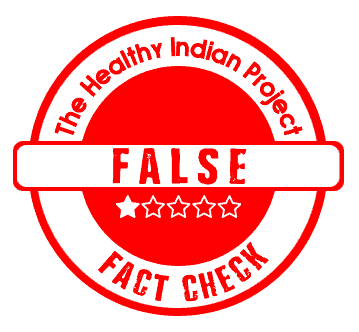Last Updated on April 22, 2024 by Neelam Singh
Quick Take
A social media post claims that someone was healed just from prayers and messages. We fact checked the claim and termed it as false.

The Claim
An X (formerly Twitter) user claimed that a person was healed through messages and prayers and a chest condition was arrested.
Fact Check
Prayers have been important for people for a long time, going back about 5000 years. They’re something many religions do and are really significant in human history. Unfortunately, superstitions have stuck around for just as long. While prayers can make people feel better emotionally and spiritually, whether they actually heal diseases is a big debate between people who believe in them and scientists.
Can prayers alone heal a chest condition?
No, it cannot heal a chest condition. Firstly, the claim doesn’t specify which chest condition was healed. Secondly, the post perpetuates the superstition that only prayers can cure illnesses. This can be risky in conditions needing immediate medical attention, potentially causing delays in diagnosis and treatment. With that being said, we respect religious sentiments and understand that prayers can provide spiritual and mental strength, complementing medical therapy by providing a positive outlook.
Why are superstitions still prevalent?
Superstitions are still prevalent for a few reasons. Firstly, they provide people with a sense of control or reassurance in situations where they might feel uncertain. A fresh example of the COVID-19 pandemic led to the rise of superstitious practices and misinformation being spread in the times of adversity. People seek reassurance and certainty that they may get from prayers, superstitions or misinformation. While prayers do no harm, superstitions can be detrimental given that it may lead to opting out of necessary medical attention.
Secondly, superstitions often stem from age old traditions or stories that have been passed down the generations. These traditions become ingrained in cultures and communities, shaping beliefs and behaviours over time. Even as society progresses and science offers explanations and in some cases better alternatives regarding many phenomena, the appeal of tradition and the comfort of familiar beliefs can keep superstitions alive.
Additionally, superstitions can serve as coping mechanisms during times of stress or adversity. When faced with challenges or fears, people may turn to superstitions as a way to cope with uncertainty or to seek hope and protection. This is especially true in situations where individuals feel a lack of control or agency over their circumstances.
Furthermore, superstitions can be reinforced by positive experiences or coincidences. If someone believes that a certain action brings good luck and then experiences a favourable outcome, they may relate it to their superstition, reinforcing their belief in its efficacy.
What can be the impact of superstitious practices when dealing with health?
Superstitious practices regarding health can have significant negative impacts. Firstly, they may result in delays in seeking proper medical help, as individuals may believe that only their beliefs can cure their ailments. This delay can deteriorate health conditions and lead to complications. Secondly, relying solely on superstitions for healing can encourage false hope, causing people to neglect necessary medical treatments that could actually benefit them. Additionally, engaging in superstitious rituals or treatments that lack scientific basis can waste precious time and resources without providing any real health benefits.
Moreover, the fear of the consequences of not following superstitions can contribute to stress and anxiety, which can further harm overall well-being. Finally, adherence to superstitions may lead to missed opportunities for preventive measures, such as vaccinations or regular health check-ups, which could help prevent illnesses before they become serious.
Superstitious beliefs concerning health have profound negative consequences, extending beyond mere delays in seeking medical help or encouraging false hope. These beliefs often result in detrimental effects on reproductive health, particularly for women. They perpetuate harmful taboos and practices surrounding menstruation, pregnancy, and female pleasure, which can stigmatise natural bodily processes and restrict access to essential healthcare services. For example, misconceptions about menstruation can isolate and marginalise women, hindering their ability to manage menstrual health and access medical care. Similarly, superstitions surrounding pregnancy and childbirth can lead to inadequate prenatal care, unsafe delivery practices, and increased maternal and infant mortality rates.
Furthermore, taboos surrounding female pleasure contribute to sexual health issues, including the spread of sexually transmitted infections and harmful gender norms. These superstitions not only undermine women’s reproductive rights and autonomy but also pose significant risks to their physical and emotional well-being. Therefore, while superstitions may offer some temporary comfort (or a placebo effect), it is essential to prioritise evidence-based medical practices for seeking good health and effectively treating illnesses.
Disclaimer: Medical Science is an ever evolving field. We strive to keep this page updated. In case you notice any discrepancy in the content, please inform us at [email protected]. You can futher read our Correction Policy here. Never disregard professional medical advice or delay seeking medical treatment because of something you have read on or accessed through this website or it's social media channels. Read our Full Disclaimer Here for further information.

